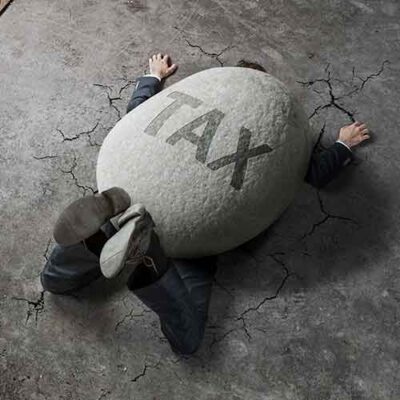Mind the pension tax traps
Understanding where they are and how to avoid them, can help you minimise the tax you pay on your pension.

Mind the pension tax traps
One of the reasons we think pensions are great is they’re a really tax-efficient way to save.
But, pensions still have some tax traps. Understanding where they are and how to avoid them, can help you minimise the tax you pay on your pension. Let’s take a closer look.
Tax traps while you’re still saving
If you earn more than £100,000, your personal allowance of £12,570 is reduced in increments until it reduces to NIL at £125,140. Once it reaches NIL, not only have you lost your tax-free allowance, you will now also be straight into the realms of 45% income tax.
What is the annual allowance?
You only get tax relief if the total amount that goes into your pension savings in a tax year (6 April to 5 April) is below the annual allowance. This includes contributions from you, and your employer if they contribute, to all the pensions you’re currently saving in – including work and personal pensions. (If you’re currently building up benefits in a ‘defined benefit’ or ‘final salary’ pension, it also includes the amount your pension builds up by in a year.
The annual allowance increased to £60,000 in April 2023.
Carrying forward your annual allowance
If you don’t use up all your annual allowance in one tax year, you can carry it forward to the next tax year and add it to that year’s annual allowance. This means you could save more than the annual allowance in that year without losing your tax relief. You can carry forward up to three years’ unused annual allowance in this way. This is a complex area of pension planning, and we would suggest you seek independent financial advice – get in touch and we can help.
Tapered annual allowance
If you’re a higher earner, your annual allowance may be lower than £60,000, down to a lower limit of £10,000 a year It goes down by £1 for every £2 of your adjusted income over £260,000. Adjusted income is all income you pay tax on in a tax year. It includes your salary and things like investment dividends or rent from properties you own. It also includes pension contributions made by you and your employer.
You also need to take your threshold income into account. This includes all income you pay tax on (including salary, dividends, rent and so on) less your pension contributions, including contributions to workplace pensions through salary sacrifice arrangements. If your threshold income is lower than £200,000 in a tax year your annual allowance won’t be reduced – whatever your adjustable income is. Again, this is complex and if you think you are caught by these rules then we’d recommend you seek independent advice. Get in touch and we can help.
Money purchase annual allowance (MPAA)
You can be hit by this allowance if you start taking money out of your pension savings while you’re still saving. It knocks the amount you and your employer can put in tax-free down to £10,000 a year. It’s meant to discourage people from taking cash out of their pension savings, then putting it back in and getting tax relief.
Tax traps when you start to take your pension savings
Lifetime allowance abolished
The Lifetime Allowance (LTA) was abolished in the 2023 Spring Budget. It governed how much could be saved in a pension before tax charges apply (this was £1,073,100 before April 2023).
For those fortunate enough to be previously caught by this trap who may have considered retiring early as a result of being caught by this – something which has specifically affected those working in the NHS – it is a welcome move to simplify things.
In reality, the LTA is being abolished from April 2024, but for the tax year 2023/2024 the calculations will still be made, however, no one will incur a tax charge in this period.
In other changes announced, a limit has been imposed on the maximum tax-free cash that an individual can take from their pensions, which has been set at 25% of the current LTA of £1,073,100. This means that from 6 April 2023, the maximum tax-free lump sum is capped at £268,275 (subject to any protection held).
As with most things like this, the devil is in the detail and we’d suggest that you take appropriate advice if you are concerned about any of this stuff.
Income tax on pension
Some people think pensions aren’t taxed, but this isn’t true. You pay income tax on pension in the same way as any other income. All the income you get in a tax year that’s above your income tax personal allowance is taxable. So all the pensions you get – including State Pension – count for income tax.
The standard income tax personal allowance is currently £12,570 a year. It’s expected to stay the same until 2026. So if you want to minimise the amount of tax you pay on your pension, keep an eye on how close your pension income is to your income tax personal allowance.
Some people have a lower or higher tax allowance.
Why your tax allowance could be lower
Your income tax personal allowance could be lower if you earn more than £100,000 in a tax year. It goes down by £1 for every £2 of income over £100,000. This is based on adjusted net income which is all your taxable income less some forms of tax relief, including higher-rate tax you’ve claimed on Gift-Aided charity donations, and tax you’ve claimed back on pension contributions. If your adjusted net income is £125,140 or more, you don’t have an income tax personal allowance.
Find out more about adjusted net income
Why your tax allowance could be higher
Married couples can transfer part of their personal allowance between them, as long as one pays basic-rate tax at 20% and the other doesn’t earn enough to pay tax. The lower earner can transfer £1,260 of their personal allowance to the higher earner so they have a personal allowance of £13,590. This is known as Marriage Allowance and could reduce your tax bill by up to £252 in a tax year.
Find out more about Marriage Allowance
Anyone who qualifies to claim Blind Person’s Allowance gets an extra income tax personal allowance of up to £2,600 for the 2022-23 tax year, making the total allowance £15,170 in this tax year.
Find out more about Blind Person’s Allowance
Can we help you?
Baffled about pensions? Not sure what the best thing is to do? Ask us for help. We love helping people get the best out of their money.
• The personal touch. We go out of our way to understand you, your life situation, and what you want.
• We really know our stuff. We’ve got over 50 years’ experience of helping people plan and achieve the retirement they want.
• We’re completely independent and unbiased.
• Your first consultation is on us.
We can help you plan the retirement you want, so you can get on with enjoying life without having to worry about money – now or in the future.
More Articles
Read the latest advice on retirement planning tips from our financial advisors to help you maximise your retirement pot.
9 August 2023
Do you need to top up your State Pension?
Get a State Pension forecast, buy extra years to increase your State Pension to the full amount.
![]() 7 minute read
7 minute read
5 May 2023
What is the 60% high income tax trap?
One of these pitfalls is the ‘hidden 60% tax rate’. If you haven’t heard of the 60% tax rate, don’t worry, you’re not alone!
![]() 3 minute read
3 minute read
4 April 2023
Are pensions or buy-to-let properties a better investment for retirement income?
Many people ask which is the better investment – a pension or property? There’s no right or wrong answer.
![]() 4 minute read
4 minute read
Speak to our retirement experts

Bespoke solutions personal to you
We’ve helped many people prepare for the type of retirement lifestyle they want. Reach out to start a conversation with one of our retirement experts.



